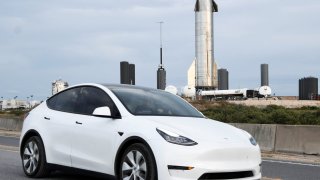
- Tesla officially moved its headquarters from Palo Alto, California to Austin, Texas CEO Elon Musk announced at the company's 2021 annual shareholder meeting.
- In April 2020, on a Tesla earnings call, Musk lashed out at California government officials calling their temporary Covid-related health orders "fascist" in an expletive-laced rant.
- In 2020, Musk personally relocated to the Austin area from Los Angeles where he had lived for two decades.
Tesla is moving its headquarters from Palo Alto, California, to Austin, Texas, CEO Elon Musk announced at the company's shareholder meeting on Thursday.
The meeting took place at Tesla's vehicle assembly plant under construction outside of Austin on a property that borders the Colorado River, near the city's airport.
Get top local stories in San Diego delivered to you every morning. >Sign up for NBC San Diego's News Headlines newsletter.
However, the company plans to increase production in its California plant regardless of the headquarters move.
"To be clear we will be continuing to expand our activities in California," Musk said. "Our intention is to increase output from Fremont and Giga Nevada by 50%. If you go to our Fremont factory it's jammed."
But, he added, "It's tough for people to afford houses, and people have to come in from far away....There's a limit to how big you can scale in the Bay Area."
Money Report
Regarding the plant underway in Austin, he noted that it would take some time to reach full production even after it's completed.
It takes Tesla less time to build a factory than to reach high-volume production, Musk said. For example, Tesla's Shanghai plant was built in 11 months, but took a year to reach high-volume production. He expects Tesla's new plant near Austin will follow Shanghai's example.
Musk's growing dissatisfaction with California has been apparent for some time. In April 2020, on a Tesla earnings call, Musk lashed out at California government officials calling their temporary Covid-related health orders "fascist" in an expletive-laced rant.
Later, Musk personally relocated to the Austin area from Los Angeles, where he had lived for two decades.
Doing so enabled Musk, who is also CEO of aerospace company SpaceX, to reduce his personal tax burden and be closer to a SpaceX launch site in Boca Chica, Texas.
Tesla's board granted Musk an executive compensation package that can earn him massive stock awards based on the automaker's market cap increases and some other financial targets. If he sells options set to expire in 2021, he could generate proceeds of more than $20 billion this year, according to InsiderScore.
California levies some of the highest personal income taxes in the country on its wealthy residents, but Texas has no personal income tax.
Tesla is not the first company to move its headquarters out of California to Texas. Oracle and Hewlett Packard are among the tech giants who decided to make that move last year, for example.
Texas has been actively recruiting companies via its Texas Economic Development Act offering tax breaks to put new facilities in the state. Austin, with a top tech university and cultural events like South by Southwest, is a draw for tech employers.
Making such a move is not particularly burdensome, explained business attorney Domenic Romano, managing partner of Romano Law in New York City. A Delaware business that has operated as a "foreign" corporation with headquarters in California, like Tesla has, could relocate its domicile by establishing a facility in a new state, hiring there and relocating key employees.
They would not have to shut down operations in other states, although they typically do pare them back.
"From a legal perspective, there's less of a regulatory burden in Texas," Romano said. "It's a more business- and employer-friendly state in many ways. You have to jump through far fewer hoops in Texas or Florida as an employer than you do in California in terms of reporting requirements and more."
Tesla has not been happy with one set of regulations in Texas at least. The state bans direct sales of cars. Instead, car companies sell their vehicles through independent, franchised dealerships there. In other states where similar laws apply Tesla has fought to change the rules or exploited some loopholes, for example, by setting up their own store and service center on tribal lands in New Mexico.
Texas Gov. Greg Abbott said the Tesla CEO supported his state's "social policies" as well. However, Elon Musk declined to weigh in on Texas' restrictive new abortion law after Abbott made that claim.
"In general, I believe government should rarely impose its will upon the people, and, when doing so, should aspire to maximize their cumulative happiness," Musk wrote on Twitter at that time. "That said, I would prefer to stay out of politics," said Musk.
Tesla has generally garnered a huge amount of support from the state of California since it was founded there in 2003. It has enjoyed grant funding, tax breaks, incentives and favorable policies from the likes of the California Air Resources Board, California Energy Commission and California Alternative Energy and Advanced Transportation Financing Authority, among others.
Clarification: This report has been updated to clarify how long it takes Tesla to build a factory versus how long it takes to reach high-volume production.






